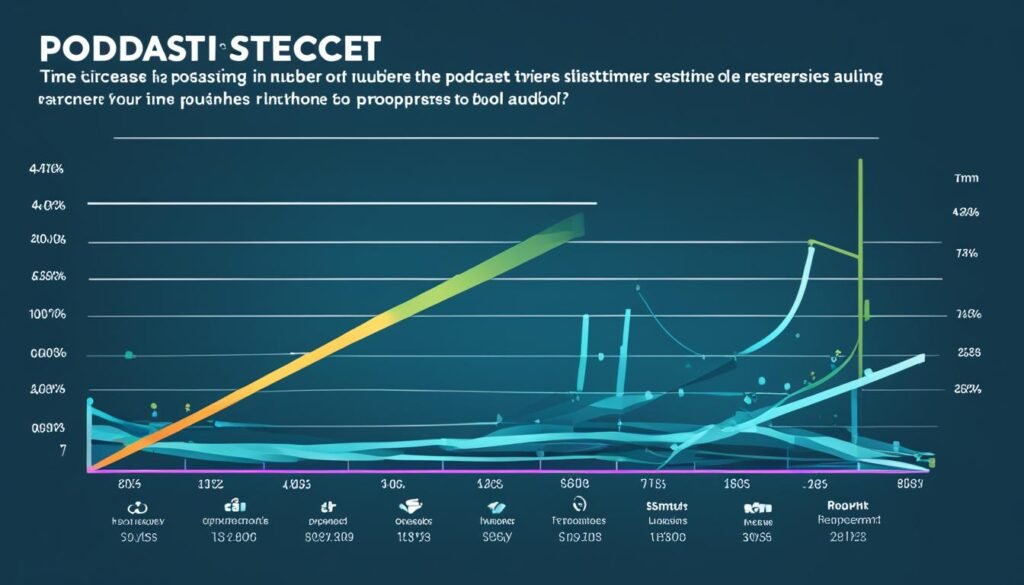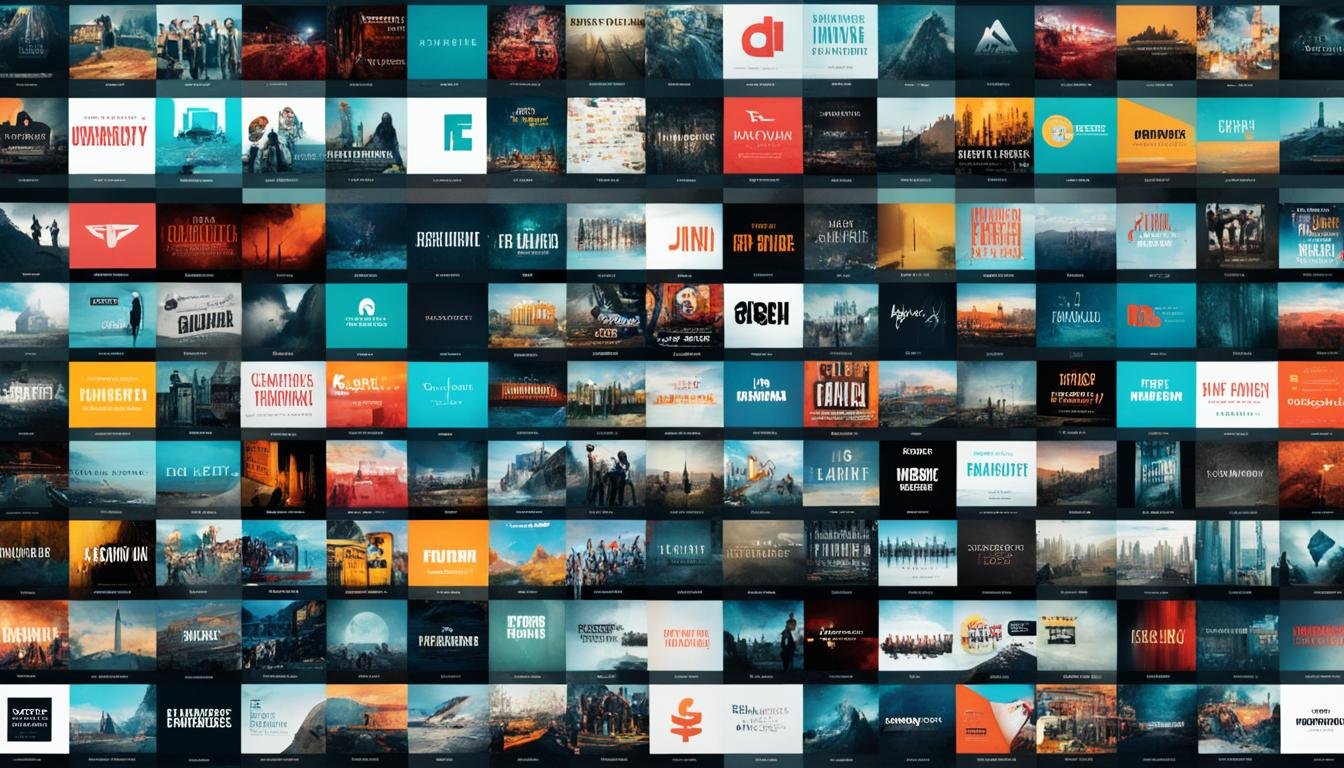The sound of a well-told story is captivating. The way a speaker uses their voice adds depth. Spoken words have immense power in the world of audio journalism.
Podcasts are a goldmine for media pros wanting to improve. They cover media changes and how to make better podcasts. These podcasts are key for keeping up with trends and boosting storytelling skills.
Looking into recommended podcasts opens up new learning opportunities. In the kingdom of content, what you say and how you say it both reign supreme. For storytellers aiming to stand out, listening to podcasts is not just helpful, it’s crucial.
The knowledge shared in these media and journalism podcasts blends passion with professionalism perfectly for audio journalism lovers.
Key Takeaways
- Understanding the significance of podcasts in media for professional development
- Exploring the wealth of podcast production techniques available to enhance audio content
- Recognizing podcasts as a vital source of information and industry trends for media professionals
- Valuing the role of storytelling in engaging and retaining podcast audiences
- Identifying how audio journalism is shaped by podcasting and its practitioners
Exploring the Rise of Podcasting in Media
Podcasting has gone from a small hobby to a big part of digital media. This change shows how podcasts are now key for both fun and content marketing. They are a big piece of how we consume media today.
The Evolution of Audio Journalism
Since starting, podcasting has changed a lot. It was first for hobbyists but now is a top tool for audio news. Big news companies and solo reporters use podcasts to reach more people. They offer deep stories and explore big issues.
Impact of Podcasts on Digital Media Consumption
Podcasts greatly change how we use digital media. More people listen to podcasts because they can while doing other things. This change has made new chances for marketers to connect with listeners. They can tell great stories and make strong communities around their shows.
The Art of Storytelling for Podcasters
Learning storytelling for podcasters changes a simple podcast to a gripping tale that keeps listeners hooked. By mixing narrative tricks with engaging podcast content, listening becomes more enjoyable. This ensures fans come back for every episode.
Good storytelling for podcasters isn’t just about listing events. It’s about creating a story arc that touches listeners deeply. Here, the use of narrative techniques is key. They turn straightforward info into captivating stories.
- Beginning with a strong hook that captures immediate attention.
- Using a compelling voice that conveys emotion and depth.
- Integrating interviews and first-hand accounts to add authenticity.
- Employing sound effects and music to enhance the atmospheric impact of the story.
To make engaging podcast content, blend each storytelling element carefully. Here’s a quick view of narrative styles you can use:
| Narrative Style | Features | Best Suited for |
|---|---|---|
| Linear | Follows a straightforward, chronological order. | Historical narratives, case studies. |
| Non-linear | Jumps around timelines or introduces parallel plots. | Complex topics, exploring multiple perspectives. |
| Serialized | Divides the story into episodes, with each episode having its own arc but contributing to a larger story. | Documentaries, dramas, ongoing investigations. |
| Interactive | Employs listener input to shape the course of the story. | Fiction, immersive storytelling experiences. |
Using these techniques, podcasters can turn basic content into engaging podcast content. This way, podcasts do more than inform. They provide an experience that educates, entertains, and engages. Podcasters must keep honing their storytelling skills. This is vital for bringing stories to life in new ways.
Key Podcasts for Media Professionals
Finding the right podcasts for media experts can really boost your knowledge. They keep you updated with new trends and approaches. Our list of leading media podcasts is packed with vital knowledge. It’s a must for those eager to excel in the ever-changing media landscape.
- Media Industry Insights: This podcast has deep talks with big names about media’s future. It offers new perspectives and key insights vital for professionals.
- The Digital Storytelling Podcast: It focuses on storytelling in today’s digital world. You’ll get tips and stories from top experts, perfect for improving storytelling skills.
- Innovate Media: Essential for those keeping up with media tech changes. It includes interviews with innovators shaping the future of media.
Below, find details on these top media podcasts that are great for actionable industry insights. We assess each podcast on focus areas, guests, and the unique insights they offer. This makes picking the best one for your needs easier.
| Podcast Name | Focus Areas | Typical Guests | Unique Value |
|---|---|---|---|
| Media Industry Insights | Future trends, industry analysis | CEOs, Analysts, Thought Leaders | Cutting-edge industry predictions |
| The Digital Storytelling Podcast | Storytelling techniques, success stories | Successful Storytellers, Content Creators | Practical storytelling strategies |
| Innovate Media | Media technology, innovation | Technologists, Media Innovators | Insights on media tech advancements |
Want to dive deeper into the media field or find inspiration? These podcasts for media professionals offer incredible resources. They’ll give you the insights to tackle the media world’s challenges.
Techniques for Superior Podcast Production
Jumping into podcast production means you can greatly improve your audio quality. We’re covering the basics of good recording. We also touch on advanced audio editing tools. This helps podcasters create top-notch sound.
Best Practices in Audio Recording
For podcasts that sound clear and professional, follow these important tips:
- Utilize a high-quality microphone to capture clear, crisp audio.
- Maintain a sound-treated environment to minimize background noise.
- Experiment with microphone positioning to find the optimal setup for your voice.
- Regularly monitor levels during recording to avoid peaking and distortion.
These steps lead to podcasts that draw in and keep listeners’ attention.
Advanced Audio Editing Software
Great podcasting isn’t just about good recording. It also involves skilled editing. Here, we compare well-known tools that can improve your podcast:
| Software | Key Features | Usability Rating |
|---|---|---|
| Audacity | Open-source, multi-track editing, support for various plug-ins | Beginner to Intermediate |
| Adobe Audition | Professional-grade editing, noise reduction, and precision effects | Intermediate to Advanced |
| GarageBand | Intuitive interface, built-in sound library, podcast-specific templates | Beginner |
| Logic Pro X | Advanced features for mixing and mastering, high-quality plugins | Advanced |
Choosing powerful editing software is key to making top-quality podcasts. It lets you fine-tune sounds for a professional feel.
Picking the Right Podcast Hosting Platforms
Choosing the right podcast hosting platform is very important. It can really affect how successful your podcast is. Below, you will see what features matter most. Plus, there’s a comparison of some of the top hosting services for podcasters.
Features to Look for in Hosting Platforms
- User Interface: The platform should be simple to use. This makes it easy for podcasters to handle their shows.
- Analytics: Having access to in-depth analytics is key. It lets podcasters get to know their audience better.
- Bandwidth: Good bandwidth is crucial. It ensures the podcast stays available, even with lots of listeners.
- Storage: Enough storage space is important. It lets podcasters keep their episodes for a long time.
- Support: Strong technical and customer support is a must. It helps fix any issues quickly.
- Integration: Being able to connect with social media helps. It’s good for promoting the podcast and reaching more people.
Comparing Popular Podcast Hosting Services
| Service | Bandwidth | Storage | Analytics | User Rating |
|---|---|---|---|---|
| Service A | Unlimited | 500 GB | Advanced | 4.5/5 |
| Service B | Limited | 100 GB | Basic | 4.0/5 |
| Service C | Unlimited | 1 TB | Intermediate | 4.8/5 |
It’s important to think about these details when choosing a platform. Think about what is most important for your podcast. Whether you need detailed analytics, lots of storage, or something easy to use, there’s a service out there for you.
How to Grow Your Podcast Audience
The key to growing a podcast audience is effective podcast promotion and strong listener engagement strategies. Creative promotional efforts paired with lively social media interactions can grow your listener base. Let’s look into ways to boost your podcast’s reach and listener connection.
Creative Promotion Strategies
- Host giveaways to boost participatory listening.
- Collaborate with other podcasters or influential figures to access new listeners.
- Use listener’s segments to build community around your show.
- Promote episodes across different audio platforms for wider visibility.
Leveraging Social Media for Listener Engagement
Maximizing listener engagement requires the power of social media. It improves visibility and fosters deeper listener conversations.
- Hold live social media sessions to talk about your episodes or what’s coming.
- Create shareable content from your podcast to boost visibility.
- Interact with your audience through polls, Q&A sessions, and feedback requests. This makes them feel important and listened to.

By mixing these podcast promotion tactics with efforts to offer valuable content, your podcast’s audience will grow steadily. The aim is not only to draw in new listeners but to build a dedicated following eager for each new episode.
Mastering Podcast Monetization
Podcasts are a great way for content creators to make money. This part talks about different ways to make money from podcasts. It looks at getting sponsors and using ads. By focusing, podcasters can turn their hobby into profit.
Effective Techniques for Monetizing Podcasts
First, know your listeners well. This helps in getting sponsorships that match your podcast. Strategic partnership with the right brands can make your audience more interested. This could lead to better sponsorship deals.
Subscription models or premium content are also key. This means charging listeners for special content. Platforms like Spotify and Apple Podcasts help creators do this easily. It encourages fans to support directly.
Understanding Sponsorships and Advertisements in Podcasting
Finding the right sponsors for your podcast is important. Choose sponsors whose products fit your podcast and audience. Check out effective advertisement strategies that work well.
- Look for sponsors who have a similar audience to your podcast.
- Use your listener data to attract sponsors.
- Make sure ads match your podcast’s style to keep trust.
Sponsors prefer podcasts that not only have a good number of listeners but also share their brand values. This makes the ads more effective.
The way to make money from podcasts is always changing as they become more popular. By using strong data and ads that fit, podcasters can manage sponsorships well. Knowing how to do this is crucial for success in the podcast world.
Content Marketing through Podcasts
Businesses are turning to content marketing through podcasts to better reach their audience. This approach combines brand storytelling with easy access to listeners. It has become a key marketing strategy today.
Podcasts are great for creating a loyal audience. They offer value and fun, making people want to keep listening. This builds a group of listeners ready to hear your marketing messages. Brand storytelling in podcasts lets businesses share their stories interestingly and personally. It helps connect with listeners who might support and buy from you.
It’s also important to share your podcasts widely. Regular posting across different platforms increases your podcast’s visibility. Teaming up with influencers and creators can help too. This cross-promotion brings in more listeners. For podcasts to really help your marketing, they should blend seamlessly with your other efforts. This creates a unified and effective marketing campaign.
For more tips on using podcasts for marketing, check out this link. It offers advice on seeing episodes as content packages and other strategies.
Understanding how to engage your audience with podcasts is key. Mixing strong brand storytelling with smart marketing strategies broadens your reach. This approach deepens connections with your audience. It leads to more loyalty and higher conversion rates.
Utilizing Audio Editing Software for Quality Production
In today’s podcasting world, clear and professional audio sets you apart. Using top-notch audio editing software is key to professional podcast sound. We’ll look at important resources and strategies to improve your audio production.
Choosing the Best Audio Editing Tools
Choosing the right audio editing software can be tough with so many options. Look for features like noise reduction, EQ adjustments, and advanced mixing. Tools like Audacity, Adobe Audition, and Logic Pro offer great features and are easy to use. They are leading choices for podcasters aiming for top sound quality.
Enhancing Podcast Audio for a Professional Sound
For professional podcast audio, effectively use your software’s advanced features. Techniques like subtle background music, sound level adjustments, and voice clarity enhancements make a huge difference. Keep your software updated and learn about new plugins to keep your sound quality high.

Producing a podcast that sounds great and connects with listeners is the main goal. With the right tools and techniques, your podcast can reach professional sound quality. This will captivate your listeners and take your content to the next level.
Conclusion
In the whirlwind of the digital landscape, podcasts for media professionals stand out as a guiding light. They provide guidance, inspiration, and knowledge. The key message is clear: embracing podcasts is not just beneficial but essential for progress in the media field. The blend of podcasting insights and digital era storytelling offers a unique chance. It allows media pros to create their story and reach audiences everywhere.
Podcasts bring a new twist to journalism by mixing traditional methods with innovative storytelling. This makes content accessible to everyone and highlights different views. The media landscape has been transformed. Not only in how we consume information but also in how creators connect with their audience. Offering deep insights and a personal touch, these digital chats are powerful. They are great for networking, learning, and building a community. With a wide range of topics, they inform, entertain, and teach.
Exploring podcasting gives media experts a detailed guide for the future of audio engagement. By combining storytelling skills with the latest technology, you can amplify your voice and maybe find new earnings. Whether you’re speaking or editing, now is the time to explore podcasts. It’s your chance to reach into the hearts and minds of listeners all over the world.
FAQ
What makes podcasts essential tools for media professionals?
Podcasts are key for media professionals because they offer a unique platform for storytelling. They delve deep into specialized topics and connect with listeners personally. This keeps professionals up-to-date on trends, improving their skills and expanding their reach.
How have podcasts impacted digital media consumption?
Podcasts have changed digital media by providing content that people can listen to anytime. This shift has altered audience engagement towards more detailed and serial content. It opens up new chances for content marketing and audience growth.
What are some effective narrative techniques for podcast storytelling?
Good podcast storytelling techniques include crafting a strong, relatable story and using interesting audio elements. Adding interviews, structuring episodes effectively, and being consistent are also key. These methods help keep and grow your listener base.
Can you recommend some top podcasts that provide industry insights for media professionals?
For media insights, top podcasts vary by interest. “This American Life” is great for narrative journalism. “The Tim Ferriss Show” offers interviewing tips. “Radiolab” excels in creative storytelling, and “The Daily” by The New York Times shines in news storytelling.
What are the best practices for high-quality podcast audio recording?
For the best audio, record in a quiet, sound-treated room. Use high-quality microphones and set levels to avoid clipping and distortion. Use pop filters and correct mic technique. A consistent setup is crucial.
How do I choose the right podcast hosting platform?
Choose a hosting platform by considering storage, bandwidth, usability, analytics, monetization, and distribution. Libsyn, Anchor, and Podbean offer various features from beginner-friendly to advanced monetization and analytics.
What strategies can help grow a podcast audience?
To grow your audience, utilize SEO and make engaging, shareable content. Engage with listeners on social media and collaborate with other podcasters. Regular publishing and interacting with your audience, like Q&A segments, build community.
How can I monetize my podcast?
Monetize through sponsorships, ads, premium content subscriptions, patronage systems like Patreon, or selling merchandise. Build a strong listener base and offer clear value to attract advertisers or sponsors.
How do podcasts fit into content marketing strategies?
Podcasts add a personal touch to branding, resonate with audiences, and establish authority. They offer valuable content that builds trust, promotes products or services, and boosts audience engagement and loyalty.
What should I look for in selecting audio editing software for podcasting?
Look for editing software with a friendly interface, multi-track support, a good feature set, and OS compatibility. Balance between ease of use and advanced features. Adobe Audition, Audacity, and GarageBand are popular among podcasters.







